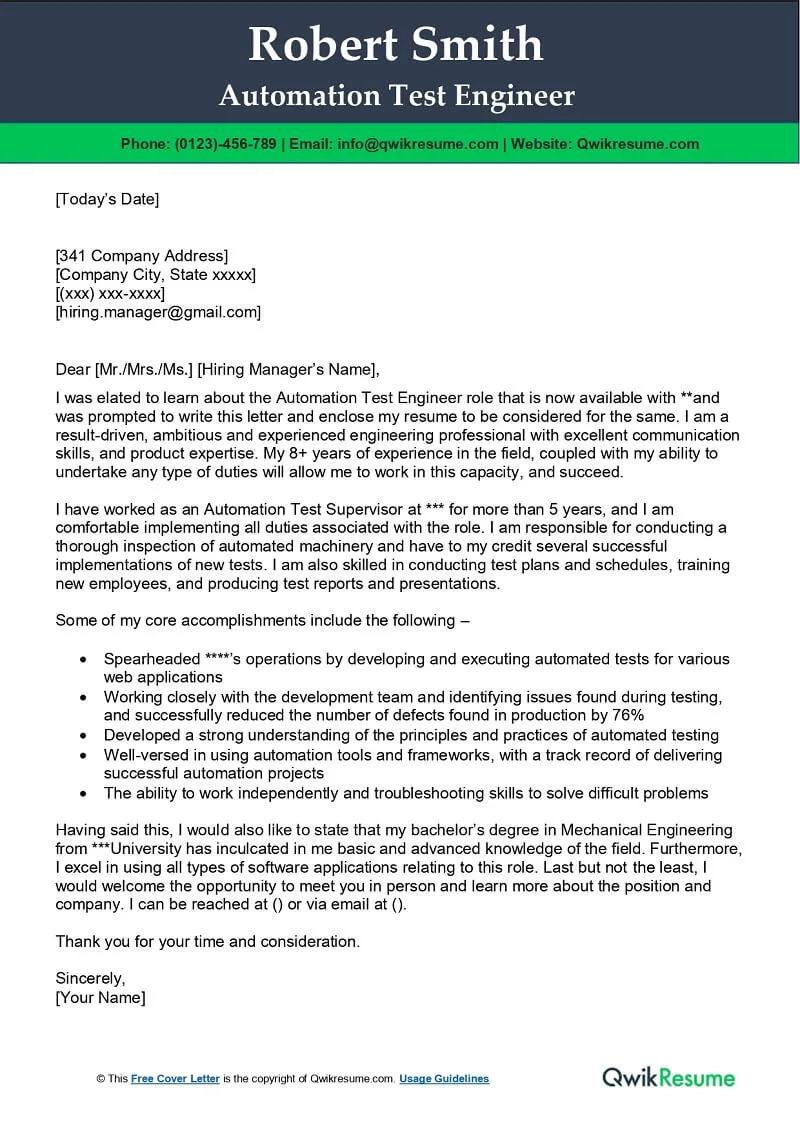Highlighting Your Field Engineering Skills
A strong cover letter for a field engineer goes beyond simply listing job duties it showcases your core competencies and demonstrates your value to a potential employer. The goal is to make your skills immediately apparent, making it easy for the hiring manager to see how you fit the role. This begins with a clear and concise introduction that immediately states the position you are applying for and how your skills align with the job requirements. This creates a positive first impression and encourages the reader to continue. The focus should be on what you can bring to the table, backed by specific examples of your past achievements and experiences. Make sure to align your skills with the specific requirements in the job description. This targeted approach shows that you’ve done your research and are genuinely interested in the opportunity.
Technical Proficiency
Field engineers rely heavily on technical expertise, so your cover letter needs to highlight this. Mention specific software, hardware, and tools you are proficient in using. Provide examples of how you’ve used these skills to solve problems or improve efficiency. Quantifiable results are especially impactful. For example, instead of saying ‘Managed network configurations,’ you could say ‘Successfully configured and maintained network infrastructure for over 500 users, resulting in a 15% reduction in network downtime.’ Specific technical skills to mention will depend on the job requirements, but common areas include experience with diagnostic tools, troubleshooting techniques, and knowledge of relevant industry standards.
Relevant Certifications
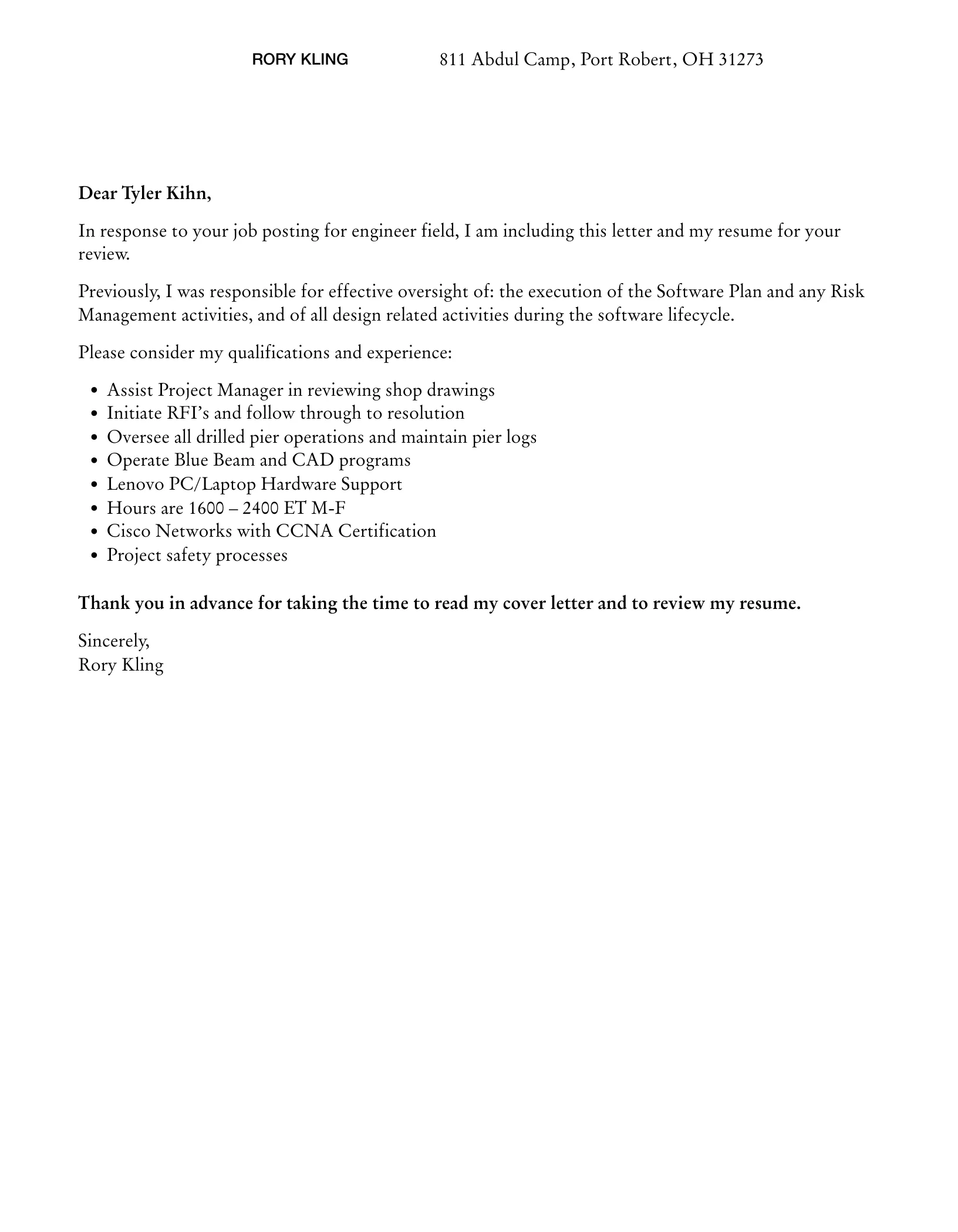
Certifications add credibility to your application. If you possess relevant certifications (e.g., Cisco Certified Network Associate CCNA, CompTIA A+), make sure to list them in your cover letter. Include the name of the certification, the issuing organization, and, if applicable, the date of issue or expiration. Certifications demonstrate a commitment to ongoing professional development and are often viewed favorably by employers. They also provide a quick way for the hiring manager to verify that you meet the baseline qualifications for the role. However, ensure that your cover letter focuses on the certifications most relevant to the specific job you are applying for, which shows you tailored your application.
Experience in Field Engineering
Detail your experience in the field, focusing on the types of projects you have worked on and the responsibilities you have held. Describe the environments in which you have worked, such as industrial, commercial, or residential settings. Quantify your achievements whenever possible. Instead of saying ‘Managed field operations,’ you could write ‘Managed field operations for projects with budgets up to $1 million, consistently delivering projects under budget and ahead of schedule.’ This level of detail helps employers understand the scope of your experience and the impact you can make in their organization. Highlighting your experience shows how well you understand industry best practices and any challenges, and how well you can overcome them.
Emphasizing Relevant Experience
The cover letter needs to mirror the job description. Review the job posting carefully to identify the key requirements and tailor your letter to reflect those needs. Avoid generic statements, and instead provide specific examples that showcase your skills and experience as they relate to the role. For example, if the job description mentions a need for experience with a particular type of equipment, make sure to highlight your experience with that equipment. It will also show that you have carefully reviewed the job posting and are genuinely interested in the position. This personalization can significantly improve your chances of getting an interview.
Project Experience
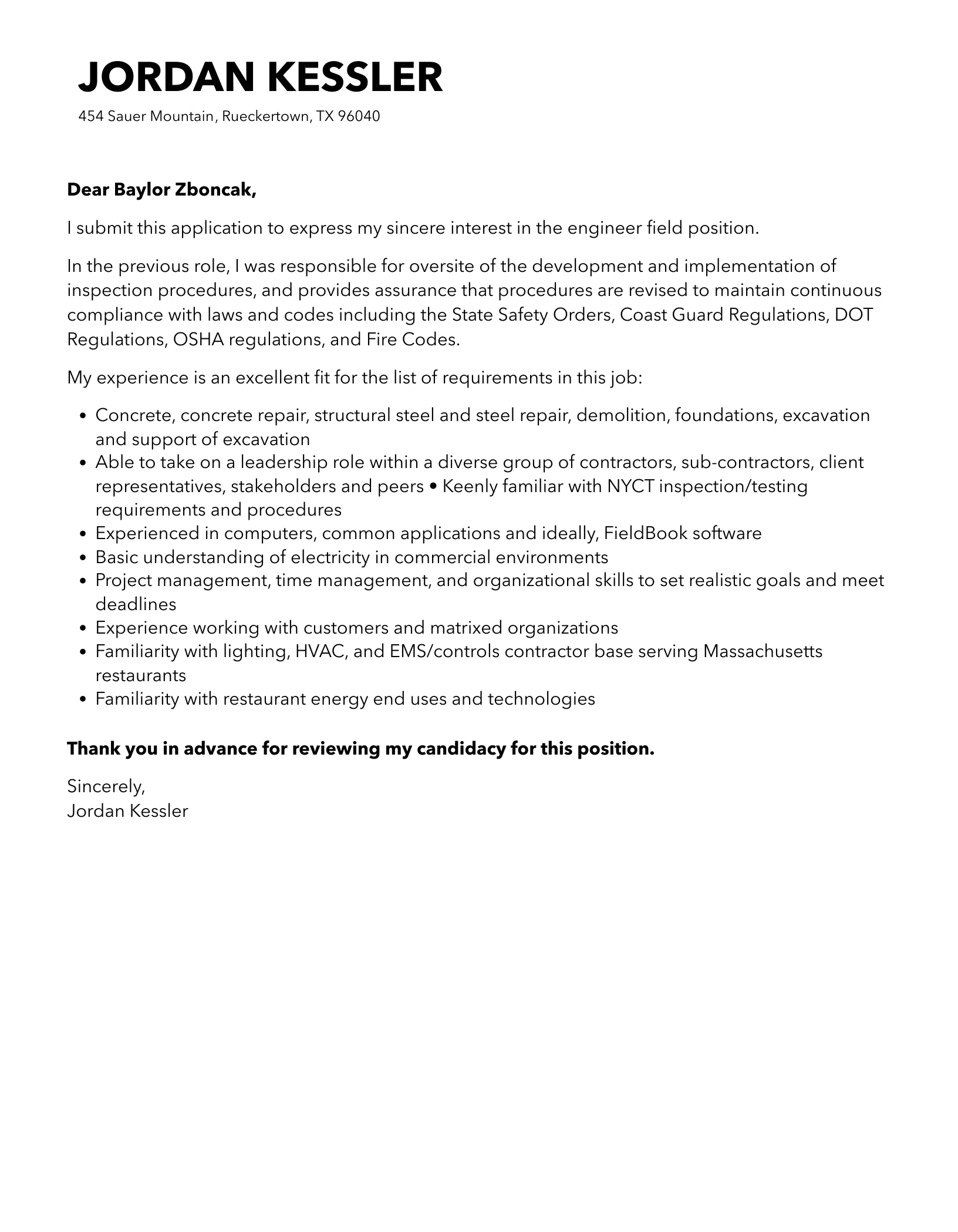
Showcase your project experience by describing the scope of the projects you’ve worked on, your role, and the outcomes. Use the STAR method (Situation, Task, Action, Result) to structure your responses. For instance, begin by describing the project’s context (Situation), detail the task you were assigned, explain the specific actions you took, and conclude with the results achieved. This structured approach helps the reader understand the project’s significance and your contribution. Mention the project’s success metrics, such as cost savings, efficiency improvements, or client satisfaction. Also, consider highlighting projects where you successfully overcame challenges or implemented innovative solutions. This will help you stand out from other applicants.
Problem-Solving Skills
Field engineers often face unexpected problems, so your cover letter must demonstrate your problem-solving abilities. Provide specific examples of how you’ve identified and resolved technical issues in the past. Explain your approach to problem-solving, highlighting your ability to analyze a situation, identify the root cause, and implement effective solutions. Quantify your achievements whenever possible. If your actions led to reduced downtime, improved efficiency, or cost savings, make sure to include these details. Showing your problem-solving skills can also set you apart, since it shows the hiring manager that you are capable of overcoming challenges effectively.
Communication Skills
Effective communication is a critical skill for field engineers. They must be able to explain technical concepts clearly to non-technical stakeholders. Your cover letter should demonstrate both your written and verbal communication skills. Your ability to articulate complex information, collaborate with team members, and interact with clients will impact your success. Presenting yourself as a strong communicator helps demonstrate your understanding that clear and concise communications are essential to your field engineer position.
Written Communication
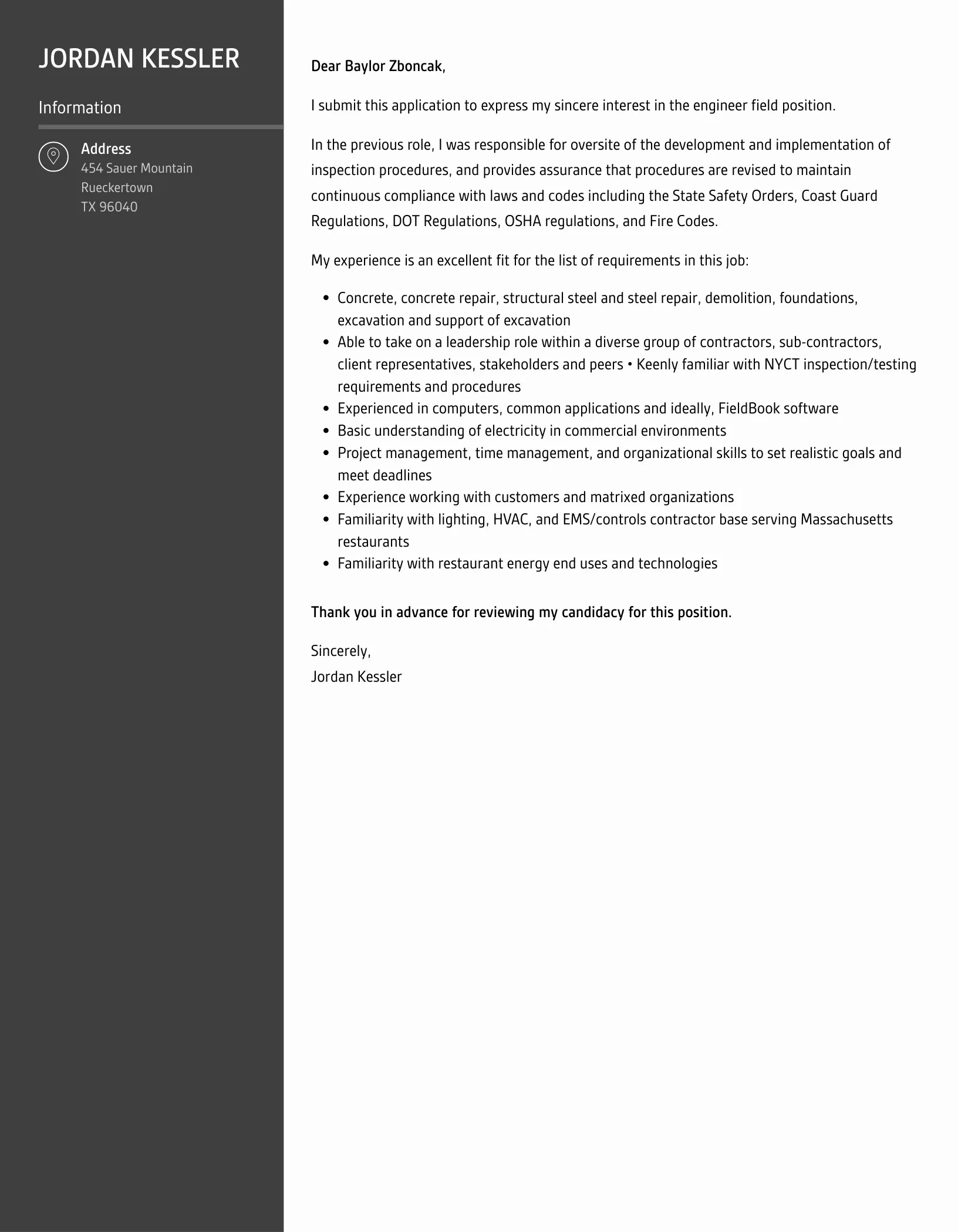
The cover letter itself serves as an example of your written communication skills. Ensure it is well-written, grammatically correct, and easy to understand. Structure your letter logically, using clear and concise language. Avoid jargon or overly technical terms unless they are necessary and clearly explained. Proofread your cover letter carefully to eliminate any errors in spelling or grammar. Having a well-written cover letter ensures your professionalism and attention to detail.
Verbal Communication
Field engineers must be able to communicate effectively with clients, team members, and supervisors. In your cover letter, you can showcase your verbal communication skills by describing situations where you successfully explained technical issues to non-technical audiences, mediated disputes, or provided clear and concise instructions. Highlighting your ability to communicate clearly and respectfully is key. The ability to listen actively and adapt your communication style to suit the audience will make you stand out.
Adaptability and Problem-Solving
Field engineers must demonstrate adaptability and excellent problem-solving skills. The ability to quickly adjust to changing situations, work under pressure, and find creative solutions to complex problems will enhance your chances of securing a job. Your cover letter is a crucial tool for communicating these skills to potential employers. Make sure your cover letter reflects these skills.
Demonstrating Adaptability
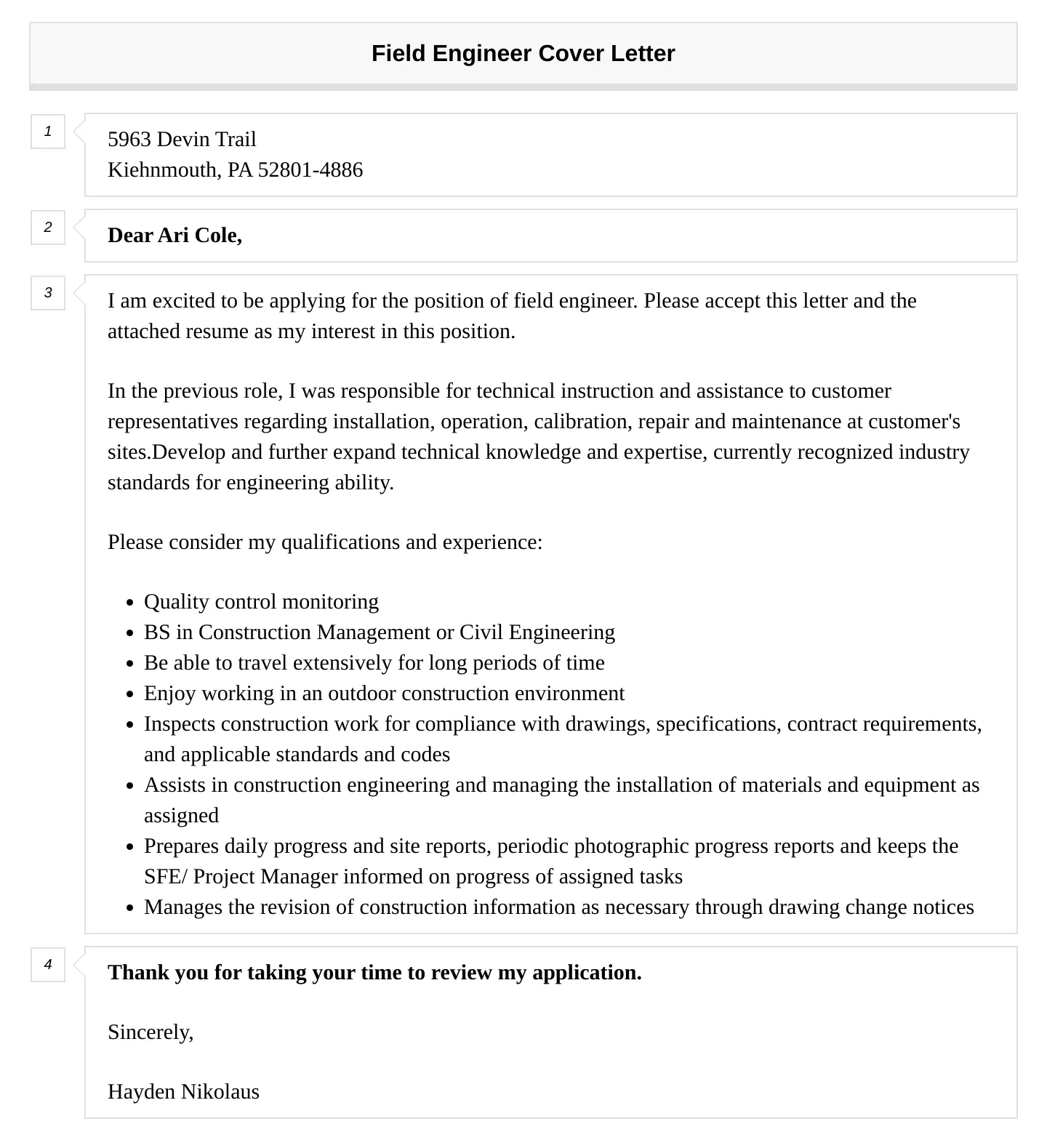
Highlight instances where you adapted to new technologies, changing project requirements, or unexpected challenges. Describe how you handled these situations, emphasizing your flexibility and willingness to learn. For example, mention situations where you had to quickly learn new software or adapt to different work environments. Showing you are adaptable demonstrates your ability to perform in dynamic and evolving roles.
Showcasing Problem-Solving Skills
Provide concrete examples of your problem-solving abilities. Describe situations where you identified a problem, analyzed the root cause, developed a solution, and implemented it successfully. Quantify the results of your actions whenever possible, such as improved efficiency, cost savings, or reduced downtime. Explain the methods you used to solve the problems, such as diagnostic tools, troubleshooting techniques, and collaboration with team members. Emphasize the positive impact of your problem-solving skills.
Formatting and Presentation
The formatting and presentation of your cover letter are crucial for making a positive first impression. A well-formatted letter shows that you pay attention to detail and are professional. Your cover letter should be easy to read and visually appealing. It should also be well-organized, ensuring that your key skills and experiences are easily accessible. Follow the standard business letter format, and ensure it is free of errors. It also demonstrates professionalism. Make sure your formatting is clean and professional.
Proper Formatting Techniques
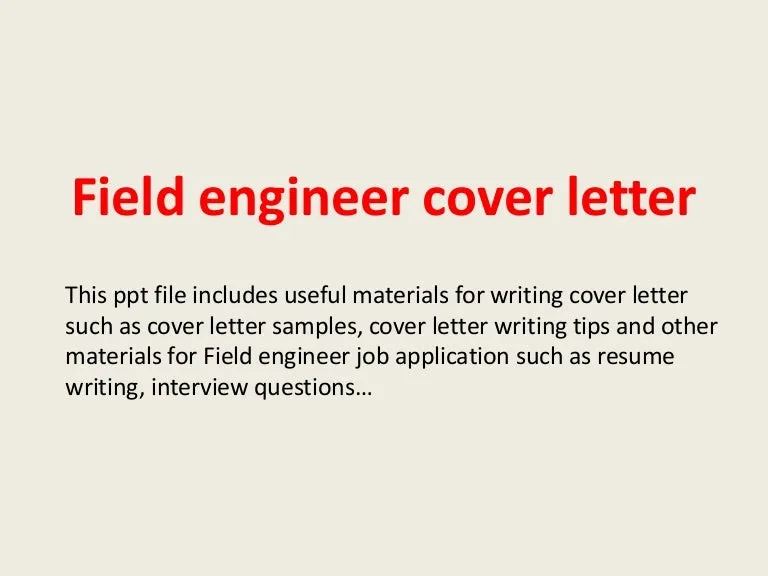
Use a professional font like Arial or Times New Roman, with a font size between 10 and 12 points. Use clear headings and subheadings to break up the text and make it easy to scan. Use white space effectively to improve readability. Make sure your contact information is clearly visible at the top of the letter. Use bullet points to highlight your key skills and achievements. Also, keep the letter concise, ideally no more than one page. Proper formatting ensures your cover letter is easy to read.
Contact Information
Your contact information is the first thing the hiring manager will see. Include your full name, phone number, email address, and LinkedIn profile URL (if you have one). Make sure your email address sounds professional. Always double-check that your contact information is accurate and up-to-date. Including your contact information ensures that the hiring manager can easily contact you for an interview. This is a critical component for your field engineer cover letter.
